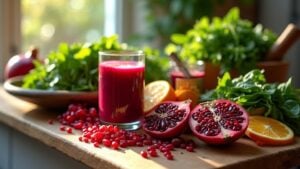Maintaining healthy blood levels naturally involves smart nutrition and lifestyle choices. Iron-rich foods like lean meats, beans, and spinach provide the raw materials for hemoglobin, while vitamin C from citrus or bell peppers helps the body absorb iron better. Folate in lentils and B12 in eggs support red blood cell production, and staying hydrated keeps blood volume balanced. Simple habits like managing stress and prioritizing sleep also play a surprising role in keeping blood strong and circulating well. There’s more to uncover about how everyday choices impact blood health.
Eat Iron-Rich Foods to Boost Hemoglobin Production
Iron plays an essential role in building healthy blood, and getting enough of it through food is one of the easiest ways to support hemoglobin production. Hemoglobin in red blood cells carries oxygen, making iron-rich foods key for energy and vitality.
Heme iron, found in red meat, fish, and poultry, absorbs better than iron from plant sources like leafy greens. Still, spinach, lentils, and beans provide non-heme iron, which helps whenever meat isn’t an option. Pairing these with vitamin C—like citrus or bell peppers—boosts absorption. A balanced mix of heme and non-heme sources keeps hemoglobin levels steady.
Should fatigue or weakness suggest low iron, consulting a healthcare provider guarantees proper care without relying solely on supplements.
Incorporate Vitamin C for Enhanced Iron Absorption
Combining iron-rich foods with vitamin C sources can substantially improve the body’s ability to absorb iron. Research shows that citrus fruits, bell peppers, or strawberries eaten alongside plant-based iron sources like spinach or lentils make the mineral more bioavailable.
This simple pairing helps the body use iron more effectively, supporting healthy blood production.
Citrus Fruits Boost Absorption
Since iron from plant-based foods isn’t absorbed as easily as the kind found in meat, pairing them with citrus fruits can make a big difference. Citrus fruits like oranges, lemons, and grapefruits are rich in vitamin C, which helps convert non-heme iron into a more bioavailable form. The ascorbic acid in these fruits reduces ferric iron (less absorbable) to ferrous iron (easier to absorb), boosting iron absorption by up to 85%.
Adding a squeeze of lemon to spinach or drinking orange juice with lentils maximizes the body’s ability to use iron. This simple strategy is especially helpful for those relying on plant-based diets or struggling with low iron levels. Including citrus fruits with meals secures better iron utilization without needing supplements.
Pair Iron With Vitamin C
Vitamin C doesn’t just fight off colds—it also releases the full potential of iron in meals. Pairing iron-rich foods with vitamin C helps the body absorb more of this essential mineral, which fuels red blood cell production. The nutrient transforms poorly absorbed ferric iron into ferrous iron, ensuring more reaches the bloodstream to support hemoglobin, circulation, and blood flow.
A 2021 study confirmed that adding 100 mg of vitamin C to a meal improved iron absorption by 67%. For best results, combine spinach with citrus fruits, lentils with bell peppers, or broccoli with tomatoes. Eating these together boosts iron bioavailability naturally, keeping blood vessels healthy and energy levels stable. Small dietary tweaks make a big difference in building blood efficiently.
Consume Folate-Rich Foods to Support Red Blood Cell Formation
Because red blood cells rely on proper DNA synthesis to form, getting enough folate is key for healthy blood production. Folate, a B vitamin, supports cell division and prevents megaloblastic anemia, where red blood cells grow too large and malfunction. Meeting the recommended daily intake (400–600 mcg for most adults) guarantees efficient blood formation.
Leafy greens like spinach and kale are packed with folate, assisting red blood cell development. Fortified cereals provide an easy breakfast option to boost folate levels. Beans and lentils deliver plant-based folate for vegetarians and vegans. Citrus fruits like oranges help absorb folate while adding flavor. Avocados and nuts offer healthy fats alongside this necessary nutrient.
Including these foods helps maintain steady blood production and reduces anemia risks.
Include Vitamin B12 Sources for Healthy Blood Cell Development
Vitamin B12 plays a critical role in healthy blood cell development, and including rich sources like meat, fish, and dairy guarantees proper red blood cell production. Without enough B12, the body struggles to form these cells efficiently, which can lead to fatigue and weakness.
Adhering to daily intake recommendations helps maintain energy levels and supports overall blood health.
Rich B12 Food Sources
Maintaining healthy red blood cells starts with getting enough vitamin B12, and luckily, plenty of delicious foods can help. This nutrient is essential for blood cell development, and a deficiency can lead to fatigue and weakness. Including B12-rich foods in the diet guarantees the body has what it needs to function properly.
Seafood: Salmon, tuna, and trout are packed with vitamin B12, supporting red blood cell production.
Dairy: Milk, yogurt, and cheese provide an easy way to boost B12 levels.
Fortified foods: Cereals, plant-based milks, and nutritional yeast help vegetarians and vegans meet their needs.
Meat & poultry: Beef, liver, and chicken are excellent sources for those who eat animal products.
Supplements: A reliable option for those with dietary restrictions or absorption issues.
Choosing these foods helps maintain steady B12 levels for ideal health.
Benefits for RBC Production
Several key nutrients collaborate to keep red blood cell production running smoothly, and vitamin B12 leads the charge. This vitamin helps form hemoglobin, the protein in red blood cells that carries oxygen. Without enough vitamin B12, the body struggles to make healthy red blood cells, leading to fatigue and anemia. Red meat, eggs, and dairy are top sources.
Folate teams up with B12 to support cell division, while iron is the backbone of hemoglobin—without it, oxygen transport falters. Copper quietly aids iron absorption, ensuring iron works efficiently. A deficiency in any of these—B12, folate, iron, or copper—can disrupt red blood cell production, leaving the body starved for oxygen.
Pairing nutrient-rich foods like spinach, lentils, and lean red meat helps maintain strong blood health.
Daily Intake Recommendations
Getting enough vitamin B12 is like giving the body’s red blood cell factory the right tools—without it, production slows down. To maintain health and improve blood flow, adults require 2.4 mcg of vitamin B12 daily, while iron necessities range from 8-18 mg. These nutrients support red blood cell development, guaranteeing oxygen reaches the heart and tissues efficiently.
- Animal sources: Meat, fish, eggs, and dairy provide natural vitamin B12.
- Plant-based options: Fortified milks, nutritional yeast, and supplements help vegetarians and vegans.
- Iron-rich foods: Leafy greens, lentils, and beans boost red blood cell production.
- Medical guidance: Those with deficiencies might necessitate higher doses under supervision.
- Hydration: Drinking water improves blood flow, aiding nutrient delivery.
Balancing these nutrients guarantees the body’s red blood cell factory runs smoothly, supporting overall health.
Stay Hydrated to Maintain Optimal Blood Volume
Because blood is roughly half water, staying hydrated plays a key role in keeping blood volume at healthy levels. Dehydration thickens blood viscosity, slowing circulation and reducing oxygen delivery. Drinking enough water guarantees smooth blood flow, while water-rich fruits and vegetables like cucumbers and watermelon boost hydration. Even mild dehydration can strain the heart and cause fatigue, making consistent fluid intake critical.
| Hydration Tip | Benefit | Example |
|---|---|---|
| Drink water consistently | Maintains blood volume | 8-10 cups daily |
| Eat hydrating foods | Supports circulation | Cucumbers, oranges |
| Monitor urine color | Tracks hydration | Pale yellow = perfect |
| Avoid excessive caffeine | Prevents dehydration | Limit coffee/soda |
| Sip before thirst strikes | Prevents blood thickening | Small, frequent sips |
Balancing water intake with electrolytes from natural sources further maximizes blood health.
Exercise Regularly to Stimulate Blood Circulation
Alongside hydration, physical activity directly supports healthy blood circulation. Regular exercise boosts oxygen delivery by improving blood flow and stimulating red blood cell production. A balanced routine combining cardiovascular exercise, strength training, and flexibility work yields the best results.
Cardiovascular exercise (walking, swimming) heightens heart efficiency, guaranteeing oxygen-rich blood reaches tissues. Aerobic activities like jogging increase hemoglobin levels, enhancing blood’s oxygen-carrying capacity. Strength training promotes circulation by building muscle, which demands more nutrient-rich blood. Yoga augments circulation through controlled breathing and poses that reduce blood stagnation. Consistency matters—150 minutes of moderate weekly activity maintains healthy hematocrit levels.
Movement signals the body to produce more red blood cells, optimizing oxygen transport. Even light activity, like stretching, helps sustain vascular health. Prioritizing movement assures the bloodstream remains efficient and resilient.
Limit Alcohol and Caffeine to Prevent Nutrient Depletion
Three key nutrients—iron, folate, and vitamin B12—take a hit as alcohol and caffeine consumption rises. Alcohol interferes with folic acid absorption and damages red blood cell production, while caffeine reduces iron uptake, worsening nutrient depletion.
Dehydration from excess caffeine or alcohol can also strain blood pressure and impede the body’s ability to maintain healthy blood levels. Cutting back helps preserve these important nutrients. Swap coffee for water or herbal teas, and limit alcohol to occasional servings.
For those relying on iron supplements or vitamin B-rich foods, minimizing these drinks guarantees better absorption. Small changes, like choosing decaf or alternating alcoholic drinks with water, protect red blood cell health. Prioritizing moderation supports natural blood-building without drastic measures.
Manage Stress to Avoid Negative Impacts on Blood Health
As stress persists for an extended period, it does not merely burden the mind—it can impair the body’s capacity to cultivate healthy blood. Elevated cortisol levels disrupt hemoglobin production, while inflammation from chronic stress hinders bone marrow function, reducing red blood cell formation. Poor circulation further complicates this, depriving tissues of oxygen.
Managing stress is essential for maintaining blood health through simple lifestyle changes.
- Meditation & deep breathing: Lowers cortisol levels, supporting hemoglobin synthesis.
- Regular movement: Improves circulation, aiding red blood cell distribution.
- Mind-body practices (yoga, tai chi): Reduces inflammation, promoting bone marrow efficiency.
- Prioritizing downtime: Balances stress hormones, safeguarding red blood cell production.
- Social connections: Emotional support mitigates stress’ impact on blood health.
Small, consistent steps in stress management foster a healthier bloodstream naturally.
Get Enough Sleep to Support Bone Marrow Function
Sleep doesn’t just recharge the mind—it fuels the body’s ability to produce healthy blood. Adequate sleep is crucial for the bone marrow, where red blood cells are made, to work efficiently. Studies show sleep deprivation disrupts this process, lowering iron levels and hemoglobin, which can lead to anemia.
Aiming for 7–9 hours nightly guarantees the bone marrow can make enough red blood cells to keep energy high and oxygen flowing. Simple sleep hygiene habits—like dimming lights early on or keeping a regular bedtime—help the body stay on track. When sleep is insufficient, fatigue and dizziness often follow, signs of struggling blood health. Prioritizing rest isn’t lazy; it’s a way to care for the blood.
Conclusion
Building blood naturally requires consistent, mindful habits. For instance, a study found that anemic patients who paired spinach (iron-rich) with orange juice (vitamin C) saw faster hemoglobin improvement than those who didn’t. Small changes—like choosing lentils over coffee or adding a brisk walk—add up. Your body thrives when nourished and cared for, so give it the tools it needs, and it’ll reward you with energy and robustness.





